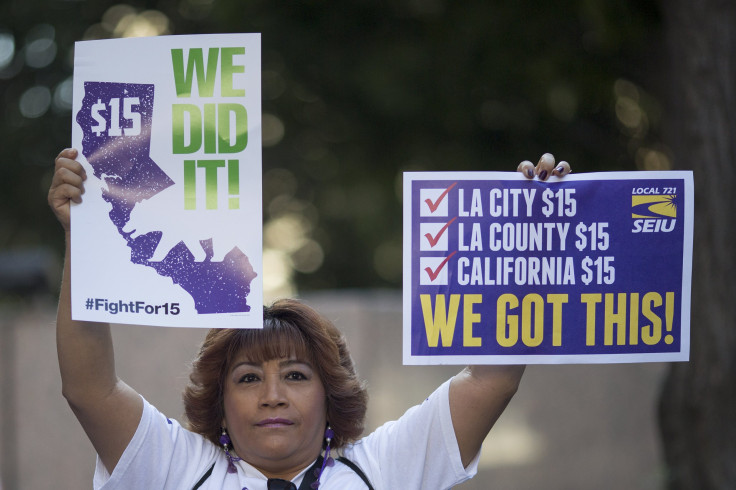Average American Salary: Minimum Wage To Increase In 2017 For 20 States Including New York, California, Arizona

A long-fought battle over minimum wage resulted in pay hikes for more than 4 million Americans that will go into effect in the coming year. A total of 20 states voted to raise their minimum wages in 2017 by varying amounts. They ranges from Democratic strongholds like California and New York to traditionally Republican states like Arizona.
“This $1.50 increase, I cannot even comprehend or tell you how important this will be,” Alvin Major, a fast food worker and 51-year-old father of four in New York City, told the Associated Press. “The price of food has gone up. Rent has gone up. Everything has gone up … This will make a difference for so many people.”
New York’s minimum wage will vary by region. New York City will raise wages to $11 an hour, while small businesses in the city will raise wages to $10.50. Pay in suburban areas will range from $9.70 an hour to $10. Massachusetts and Washington state chose to raise minimum wages the most, to $11 an hour. California voted to raise wages for businesses with 26 or more employees to $10.50.
A number of other states including New Jersey, Hawaii and Colorado will also see changes in minimum wages in 2017. The national minimum wage, on the other hand, hasn’t changed since it was raised to $7.25 in 2009.
“These aren’t only teens trying to make some pocket money,” senior staff attorney at the National Employment Law Project Tsedeye Gebreselassie told the Associated Press. “Increasingly its adults who are using this money to support their families.”
As of August 2016, 29 states and Washington D.C. had minimum wage rates higher than the federally mandated rates. Fourteen states had minimum wages that were the same as the federal minimum wage, and five states, including Tennessee and Alabama, had no minimum wage law.
A worker employed full time at the current federal minimum wage earns $15,080 per year. In 1968, the federal minimum wage was $1.60 per hour, or the equivalent of $10.34 in 2012 dollars when adjusting for inflation, according to the Center for Poverty Research at the University of California, Davis. Conversely, the average salary for a median household income was $51,939, according to the most recent Census Bureau data.
President-elect Donald Trump has voiced mixed feelings about minimum wage in the country. In May, Trump said he thought minimum wage laws should be left up to the states and that the federal government should have no role. In July, he said the federal minimum wage should be hiked to at least $10 an hour. By November, Trump announced that he thought wages were too high, though he later clarified he was only referring to the way minimum wage hikes would affect businesses’ ability to compete.
A map of each state and its minimum wage law can be found here.
© Copyright IBTimes 2024. All rights reserved.






















